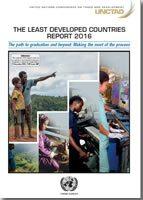
Graduation is the process through which a country ceases to be an LDC, having in principle overcome the structural handicaps that warrant special support from the international community, beyond that generally granted to other developing countries. However, the Report argues that it should be regarded, not as a winning post, but rather as a milestone in a country's long-term economic and social development.
Thus, the focus should not be on graduation itself, but rather on "graduation with momentum", which will lay the foundations for long-term development and allow potential pitfalls to be avoided far beyond the country's exit from the LDC category.
Structural transformation, the importance of which is explicitly recognized in the 2030 Agenda for Sustainable Development, plays a fundamental role in this process.
Projections conducted for the Report suggest that only 16 of the 48 current LDCs are likely to fulfil the graduation criteria by 2021, well short of the IPoA target. Unless effective national and international action is taken, the ensuing graduations are also likely to widen the development gap between the remaining LDCs and other developing countries still further.
While there are numerous international support measures (ISMs) for LDCs, their contribution towards graduation is undermined to varying degrees by vague formulation, non-enforceability of commitments, insufficient funding, slow operationalization and exogenous developments in international trade and finance. Their effectiveness also depends critically on the institutional capacities of each LDC to leverage them in support of its own development agenda. Nonetheless, loss of access to LDC-specific trade preferences after graduation may entail substantial costs, estimated by the Report to be in the order of $4.2 billion per year across LDCs as a whole. Such losses underscore the importance of effective smooth transition procedures, and of strong leadership and sound preparation on the part of LDC governments.
The Report highlights the need for LDCs to move from graduation strategies focused on qualification for graduation to "graduation-plus" strategies that take a long-term perspective and foster structural transformation.
Elements of such strategies include:
-
Coordinated measures to upgrade agriculture and promote non-farm activities.
-
A combination of cross-sectoral and sector-specific industrial policies.
-
A considerable scaling up of public investment, especially in rural areas, to strategically address bottlenecks in the productive sector.
-
Addressing gender inequality across all policy areas, to ensure fuller and more effective use of human resources.
Better and more effective ISMs are also needed, as well as a more stable and development-oriented international environment.
FRONT COVER
The top picture signifies the importance of a forward-looking view of graduation, looking beyond qualification to the challenges that lie ahead. The remaining photos depict the transition of economic activities towards progressively higher levels of sophistication and diversification that underlies the development of productive capacities - starting from agriculture, through handicrafts and light manufacturing, to high-technology production.


